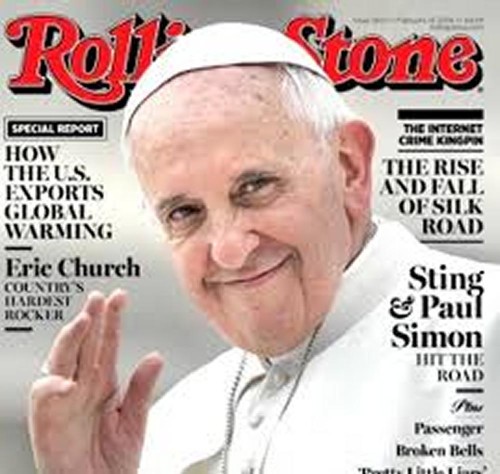
By Susan Gately - 31 January, 2014
 Today the February edition of Rolling Stone hits the shelves of newsagents, and for the first time ever the cover picture features the leader of the Roman Catholic Church.
Today the February edition of Rolling Stone hits the shelves of newsagents, and for the first time ever the cover picture features the leader of the Roman Catholic Church.
Below a photo of the waving Pontiff, the first to join the ranks of popstars who are the usual mainstay of the magazine’s cover, is the headline: ‘The times they are a-changin’’
Inside, the magazine publishes a 7,700 word article by Mark Binelli, who writing very much from the point of view of an outsider to Catholic faith and culture, leads the reader through an account of a typical audience in St Peter’s Square.
He recounts how Pope Francis takes “the best part of an hour” to go around St Peter’s greeting people, with pilgrims “shamelessly” shouting “i bambini, i bambini” as they try to have him kiss a child or baby.
His comparison of Pope Francis to Pope Benedict, leaves Francis as the ‘cool one’ and somewhat unfairly caricatures Pope Benedict as Nightmare On Elm Street character Freddy Kruger. Well into the article, Binelli tells the life story of Jorge Mario Bergoglio, including his ‘epiphany’ at age seventeen.
“Then, at 17, while meeting some friends, he walked past a church and had an epiphany. In an interview with a Buenos Aires radio station, Bergoglio described feeling “like somebody grabbed me from inside and took me to the confessional… While I was there I felt that I had to become a priest, and I didn’t doubt it.”
Binelli then goes on to describe how the young Bergoglio became a Jesuit priest, rose to provincial superior of the Order in Argentina, and during that time made his mistakes in leadership, with too ‘authoritarian’ and individual a style.
“Bergoglio used the word ‘authoritarianism’ to describe his leadership style back then, admitting, ‘I did not always do the necessary consultation… My style of government as a Jesuit at the beginning had many faults’.”
According the writer, he was “exiled” to Cordoba, where he had time to think about his actions and life.
“The chastening had forced Bergoglio to mature, mellow, open his mind,” writes Binelli. “Six years later, in 1998, he became archbishop of Buenos Aires.
Foreshadowing his behavior as pope, he rejected many of the princely trappings of his new office, getting around town via bus, residing in a simple apartment and cooking his own meals on weekends.
An interviewer once asked if he was a good cook, to which Bergoglio responded, ‘Well, no one ever died.’ He would ask friends to tape CDs for him, because all he had was a cassette player.
Binelli has viewed the Youtube video of the interview and describes it in detail.
“A reporter asks Francis, who is standing at the head of the aisle, about the existence of a ‘gay lobby’ within the Vatican. Francis begins by making a joke, saying he hasn’t yet run into anyone with a special gay identification card. But then his face becomes serious and, gesturing for emphasis, he says it’s important to distinguish between lobbies, which are bad.”
“‘A lobby of the greedy, a lobby of politicians, a lobby of Masons, so many lobbies!’ he says later in the press conference. Of individual gay people who are well-intentioned and seeking God, he makes the ‘Who am I to judge?’ remark,” he writes.
The journalist is impressed by the Pope’s first apostolic exhortation.
“Apostolic exhortations under John Paul II and Benedict tended toward the dogmatic (JPII’s Familiaris Consortio restated orthodox Church teaching on birth control and the traditional family) or the wonky (Benedict’s Sacramentum Caritatis spent 32,000 words on the Eucharist). In this context, the blistering attacks on income inequality in Francis’ Evangelii Gaudium (‘The Joy of the Gospel’) resonate like a bomb.”
“He describes a ‘culture of prosperity’ that ‘deadens us’ to the misery of the poor: ‘All those lives stunted for lack of opportunity seem a mere spectacle; they fail to move us.'”
When he was elected, Pope Francis was not expected to be a significant change from Pope Benedict.
“But the media’s normally infallible cynicism melted in the presence of such pontifical delightfulness. He cancelled his own newspaper subscription, cold-called people who’d sent him letters (‘Ciao, Michele, it’s Pope Francis,’ he told one stunned Italian) and said nice things about atheists. A plotline that would’ve sounded preposterous six months earlier swept the secular media – that of ‘Cool Pope Francis’.”
The full text of Rolling Stone’s feature on Pope Francis is at http://www.rollingstone.com/culture/news/pope-francis-the-times-they-are-a-changin-20140128
For news updates from CatholicIreland.net follow us on Twitter: @CINetNews